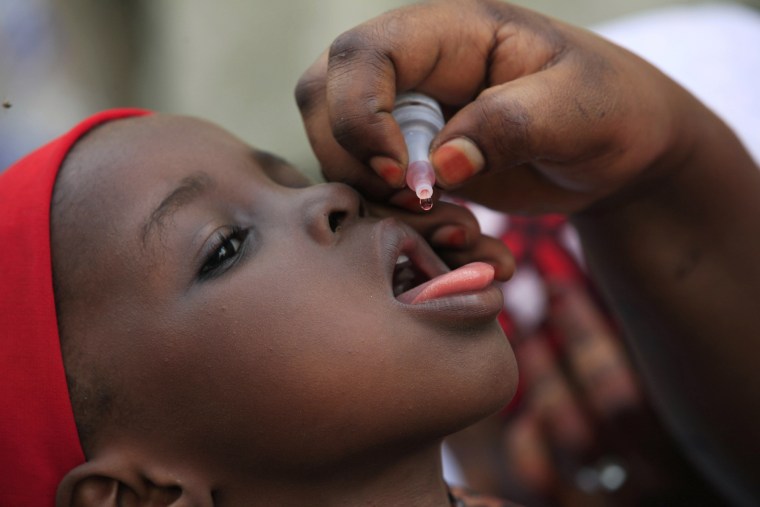Nigeria has been declared free of transmission of polio, leaving just two countries in the world where the virus is still regularly spreading: Pakistan and Afghanistan.
It's a big step towards the eradication of a disease that paralyzes children for life and that's easy to prevent with a vaccine that costs just a few cents.
The World Health Organization announcement means that polio is no longer endemic in Nigeria, which was the last country in Africa with regular, ongoing transmission of the virus.
RELATED: Liberia is free of Ebola again, remains on ‘heightened surveillance’
"Eradicating polio will be one of the greatest achievements in human history, and have a positive impact on global health for generations to come," WHO said in a statement.
"Nigeria has brought the world one major step closer to achieving this goal and it's critical that we seize this opportunity to end polio for good and ensure future generations of children are free from this devastating disease."
Vaccine workers battled mistrust and rumors, and worked around attacks by the militant group Boko Haram, to get kids vaccinated against the paralyzing virus, said John Vertefeuille, polio incident manager for the U.S. Centers for Disease Control and Prevention.
"They would just go out day after day and make sure they were getting vaccine into kids," Vertefeuille told NBC News.
It'll be two more years before Africa is declared polio-free. The virus can lurk in the body and it can go unreported in rural areas, so it takes a few years to be certain the virus isn't popping up anywhere. But it is not being actively transmitted, WHO said.
"The outstanding commitment and efforts that got Nigeria off the endemic list must continue, to keep Africa polio-free. We must now support the efforts in Pakistan and Afghanistan so they soon join the polio-free world," said WHO director-general Dr. Margaret Chan.
WHO is part of the Global Polio Eradication Initiative, which includes national governments, the non-profit Rotary International, the CDC, UNICEF, and the Bill & Melinda Gates Foundation. They've been pushing hard to eliminate polio, which infects only humans so it could be eliminated by vaccinated, as smallpox was in 1979.
Just 41 cases of polio have been reported globally, compared to 200 cases this time last year.
RELATED: Food and Drug Administration takes on food poisoning with sweeping reforms
"As recently as 2012, Nigeria accounted for more than half of all polio cases worldwide," the Global Polio Eradication Initiative said in a statement.
"Since then, a concerted effort by all levels of government, civil society, religious leaders and tens of thousands of dedicated health workers have resulted in Nigeria successfully stopping polio. More than 200,000 volunteers across the country repeatedly immunized more than 45 million children under the age of five years, to ensure that no child would suffer from this paralyzing disease."
War and unrest is the biggest barrier to vaccination. Rumors and fears about the vaccine also interfere. Nigerian workers had to fight rumors that the vaccine was deliberately formulated to make Muslims sterile, and one successful approach was getting a vaccine that was manufactured in Indonesia, a Muslim country.
Attacks by Boko Haram, a militant Islamist group that is fighting Nigeria's government, added to the complications.
Militants still make it very difficult to vaccinate people in Afghanistan and Pakistan. Attacks on vaccination teams make the work dangerous.
"As long as polio exists anywhere, it's a threat to children everywhere," the polio initiative group said.
Polio is the virus. Poliomyelitis is the disease caused when the virus infects the spinal cord.
It's transmitted through contaminated food and water. Most people who are infected develop no symptoms and don't even know they've got it. But in about 1 in 200 cases, the virus destroys the nerve cells that activate muscles, causing irreversible paralysis, usually in the legs. It can paralyze breathing muscles, too, sometimes causing death.
There are two types of vaccine, on oral and one injected. Vaccination has reduced the number of cases by 99 percent since 1988, which polio paralyzed 350,000 children a year. The last U.S. case of poliowas in 1979, although many people survive with the permanent effects of the virus.
Missing just a few years of vaccination can allow the virus to come back and spread. Travelers often spread the virus.
"This is a clear example of success under very difficult circumstances. It shows we can eradicate polio if proven strategies are fully implemented," CDC director Dr. Tom Frieden said in a statement.
"We are moving decisively toward ending a disease that has paralyzed tens of millions of children. In this final mile, we must remain committed to providing the resources and the support to the front lines to make this worthy goal a reality."
Syria had an outbreak of polio when the fighting there interrupted vaccination programs, and 35 kids were paralyzed by polio in 2013. Groups stepped up vaccination campaigns and there hasn't been a case reported in Syria since January 2014.
This article first appeared on NBCNews.com.
